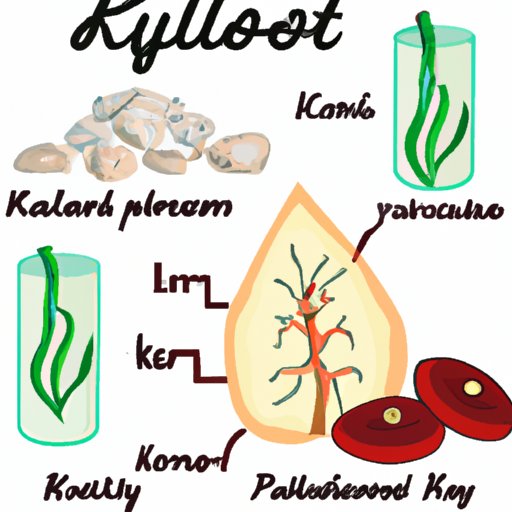Introduction
Kidney stones are hard deposits that form when minerals in the urine crystallize and become solid. They can be very painful and may require medical treatment to pass. Fortunately, there are several steps you can take to reduce your risk of developing kidney stones, including eating a healthy diet. This article will explore what is the best diet for kidney stones and provide helpful tips for creating an effective meal plan.
A Comprehensive Guide to the Best Diet for Kidney Stones
When it comes to preventing and managing kidney stones, nutrition is key. Eating the right foods can help reduce your risk of developing stones, while reducing the severity of existing stones. Here is a comprehensive guide to the best diet for kidney stones.
What You Should Know About Nutrition and Kidney Stones
Certain types of food can increase your risk of developing kidney stones. These include foods high in sodium, sugar, and animal protein. Additionally, some people are at higher risk of developing stones due to their genetics, so they should pay close attention to their diet. For example, those with a history of gout or hyperuricemia should avoid foods high in purines.
The Top 5 Foods to Help Prevent Kidney Stones
The following foods are beneficial for helping to prevent kidney stones:
Water
Staying hydrated is essential for preventing kidney stones. Drinking plenty of water helps flush out toxins from the body and dilutes the concentration of minerals in the urine, which reduces the risk of stone formation. Experts recommend drinking at least 2 liters (8 cups) of water per day.
Calcium-Rich Foods
Eating calcium-rich foods such as dairy products, leafy greens, and tofu can help reduce the risk of kidney stones. Calcium binds to oxalates in the gut, preventing them from being absorbed into the bloodstream. This reduces the amount of oxalates in the urine, which lowers the risk of stone formation.
Fruits and Vegetables
Fruits and vegetables are packed with vitamins, minerals, and fiber, which are important for overall health. They are also rich in antioxidants, which can help protect against cell damage and reduce inflammation. Eating plenty of fruits and veggies can help keep your kidneys healthy and reduce your risk of developing stones.
Whole Grains
Whole grains are a great source of fiber and other essential nutrients. They also contain phytochemicals that can help reduce inflammation and protect against cell damage. Eating whole grains can help keep your kidneys functioning properly and reduce your risk of developing stones.
Lean Proteins
Lean proteins such as fish, poultry, beans, and eggs are essential for maintaining muscle mass and providing the body with energy. They are also low in fat and free of cholesterol, making them a great option for those trying to reduce their risk of kidney stones.
The Benefits of Eating a Low Oxalate Diet for Kidney Stones
Oxalates are naturally occurring compounds found in some foods. High levels of oxalates in the urine can increase the risk of stone formation. Therefore, eating a low oxalate diet may help reduce the risk of kidney stones. Some foods that are high in oxalates include spinach, rhubarb, beets, nuts, and chocolate.

How to Create an Effective Meal Plan to Combat Kidney Stones
Creating a meal plan is an effective way to ensure you’re getting all the nutrients you need while avoiding foods that could increase your risk of developing kidney stones. Here are some tips for creating a meal plan:
Tips for Creating a Meal Plan
- Include plenty of fresh fruits and vegetables.
- Eat lean proteins such as fish, poultry, and beans.
- Avoid processed and high-sodium foods.
- Choose whole grains over refined grains.
- Drink plenty of water throughout the day.
- Limit foods high in oxalates, if necessary.
Sample Meal Plan
- Breakfast: Oatmeal with berries and almonds
- Lunch: Green salad with grilled chicken, tomatoes, and olive oil dressing
- Snack: Apple with peanut butter
- Dinner: Baked salmon with roasted vegetables and brown rice
Conclusion
Kidney stones can be painful and difficult to pass. However, eating a healthy diet can help reduce your risk of developing stones and ease the symptoms of existing stones. The best diet for kidney stones includes plenty of water, calcium-rich foods, fruits and vegetables, whole grains, and lean proteins. Additionally, those at higher risk of developing stones may benefit from eating a low oxalate diet. Finally, creating a meal plan can help ensure you’re getting all the nutrients you need while avoiding foods that could increase your risk of developing kidney stones.
Summary of Key Points
- Certain foods can increase your risk of developing kidney stones.
- The top 5 foods to help prevent kidney stones are water, calcium-rich foods, fruits and vegetables, whole grains, and lean proteins.
- Eating a low oxalate diet may help reduce the risk of stone formation.
- Creating a meal plan can help ensure you’re getting all the nutrients you need while avoiding foods that could increase your risk of developing kidney stones.
Final Thoughts
Eating a healthy diet is an important part of helping to prevent and manage kidney stones. Incorporating the above-mentioned foods into your diet can help reduce your risk of developing stones and ease the symptoms of existing stones. Additionally, creating a meal plan tailored to your needs can help ensure you’re getting all the nutrients you need while avoiding foods that could increase your risk of developing kidney stones.
(Note: Is this article not meeting your expectations? Do you have knowledge or insights to share? Unlock new opportunities and expand your reach by joining our authors team. Click Registration to join us and share your expertise with our readers.)
